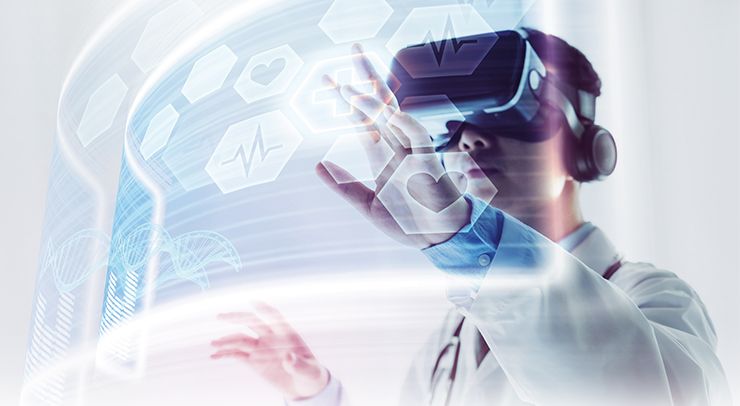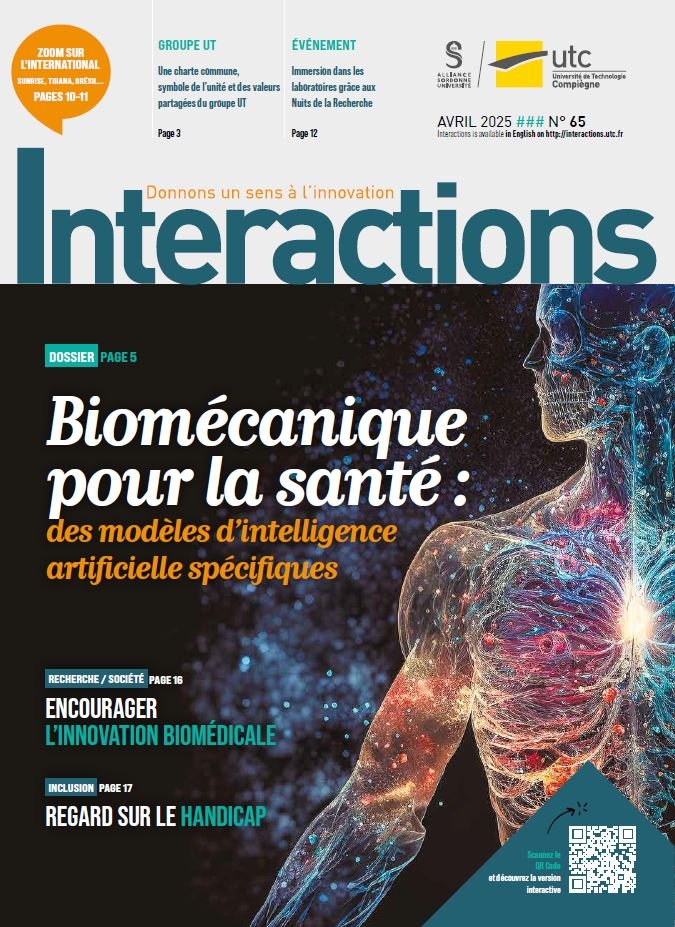A rendez-vous to encourage and enhance biomedical innovation

The 3rd UTC Biomedical Rendezvous was held on Friday 22 January, 2021. A virtual edition with online exchanges and conferences. On the programme, Stéphane Kirche, Regional Director for Innovation and Biomedical Engineering and Alexandre Benoist, Clinical Engineer at the Saône-et-Loire Bresse Morvan Hospital Group, spoke about «The digital hospital: innovation in medical practices, training and management of a ‘GHT’ (Territorial Hospital Group).
Stéphane Kirche, Regional Director for Innovation and Biomedical Engineering, and Alexandre Benoist, Clinical Engineer at the Saône-et-Loire Bresse Morvan Hospital Group, were able to present, during the recent (3rd) Biomédical Rendez-vous their day-to-day vision of a “digital hospital” and to share with the audience some innovations that can be observed in medical practice, training and the management of their establishment. “New medical devices are now more complex, more mobile, interconnected and include artificial intelligence. The skills of professionals must also progress. Caregivers are also becoming producers of data at the patient’s bedside. This is the famous “augmented caregiver”, they explained. “We need solutions that improve the quality of work and reduce the pressure to attain more predictive, preventive, personalised and participatory medicine. At the same time,five billion people cannot benefit from medical imaging techniques. Health research, care and innovation must constantly evolve.”
Value-adding to biomedical data
By 2022, 70% of care will have to be provided on an outpatient basis. This is a new situation, which is pushing health establishments to communicate with the outside world (town medicine, GPs, public health organisations, etc.). “In a healthcare establishment, there are three levels ofi nformation: the first is at the patient’s level and concerns identity monitoring, the second is at the level of the healthcare team, this data will enable the management and coordination of healthcare professionals, and finally, the collection of data will advance research,” summarises Stéphane Kirche. The standardisation of the medical device management policy in our health territories facilitates the collection of data produced, makes it possible to have all the data available at each stage of the patient’s journey, reduces the risk of error and makes the care environment safer. “The issue is a major one, because in just a few years it has become the cornerstone of the performance assessment of our healthcare institutions,” says Alexandre Benoist.
Research lends weight
This edition also featured the remarkable intervention of Christophe Eglès, professor at UTC-BMBI, who presented the applications of additive manufacturing for the design of specific patient prostheses. This topical subject elicited numerous reactions both from the point of view of the materials used and usable and the regulatory approach for successful integration into the patient care pathway. Christophe Eglès explains: “Approaching patients from the start of the project to assess the acceptance of technological choices is an essential prerequisite for the success of a medical innovation”. Through working on bioengineering and the development of health technologies, in phase with the social and societal stakes and at the service of the patient, the research laboratories of the UTC, including the BMBI, Costech and Heudiasyc Laboratories, all serve as support and lend their weight to those biomedical training courses singled out as exemplary during this event.
Pioneers in biomedical training
UTC has been a pioneer in the training of biomedical engineers who work in health establishments as well as in companies. Therefore, it has a very important and active network of graduates in this field (from 50 to 70 graduates per year over the past 40 years). Today, its training courses include the diploma in biological engineering, the biomedical major, the Master’s degree in health engineering, which organises the Biomedical Rendezvous, the Master’s degree in Biomechanics and Bioengineering, and the specialised Master’s degree in Biomedical Technologies. They are the heirs of pioneering courses such as the DESS in Biomedical Engineering and the IBMH master’s degree. “These courses meet the needs of the health sector, which is highly innovative in terms of technology and subject to imperative quality requirements, standards and regulations. They enable the training of reactive and multidisciplinary players capable of designing, operating and maintaining high-performance medical technical platforms while taking into account organisational and safety constraints. Their expertise on medical devices is put to good use in a complex environment (ecosystem including companies, health establishments and institutional and regulatory bodies) for the benefit of the patient”, stresses Isabelle Claude, Head of UTC’s Master’s degree in Health Engineering, Biomedical Technologies and Health Territories.
Rendez-vous January 22, 2022
“However, other schools and universities (Polytech Lyon and Marseille, ISIFC Besançon) have opened such courses and the competition is growing. UTC has to keep and consolidate its leading position. The Biomedical Rendezvous was created in order to propose an annual event for the French biomedical community and to make it become a yearly “must” venue. It contributes to the animation of the biomedical network, which relies on the very dynamic and diverse health sector via conferences of professionals and researchers,” says Jean-Matthieu Prot, lecturer-cum-research scientist in charge of the UTC Medical Devices and Regulatory Affairs course. It is also an ideal moment to encourage and enhance contacts between the students of the biomedical courses at UTC, the lecturers, research scientists and the professional world, to present different professional trajectories illustrating the diversity of the outlets of the courses of the UTC and to throw light on work and studies carried out by the biomedical students. We look forward to seeing you at the next edition, scheduled January 21, 2022.
Zoom on some biomedical student projects at UTC
Célestin Garcelon and Justin Lanne have developed an interface between patient and hospital-based equipment in partnership with the Amiens-Picardie University Hospital. In the palliative care department, many nursing calls cannot be made because of the patient’s physical condition. “The idea is to design a universal tool via an EMG signal detected when the patient has a contraction. We are in the process of prototyping. It is not up to the patient to adapt to the equipment but more the reverse,” they insist. Paul Brochet and Megane Fosso Matchinde have worked with a Nantes based start-up to propose a regulatory roadmap to facilitate the marketing of its photoacoustic imaging innovation. The applications of virtual reality in health were presented by Marie Pincemail’s team. In particular, she emphasised the benefits of this tool for training health professionalsby simulating exceptional situations that complement traditional training. Yunshi Han has developed a magnetically controlled robot capsule for micro-biopsies and drug delivery with the University of Waterloo (Belgium). Another student project among many others — that of Vincent Millot-Maysounabe — is based on the 3D reconstruction of the bile ducts with the ISIR, the Saint-Antoine Hospital in Paris and the BMBI laboratory of the UTC. “The aim is to simplify endoscopic retrograde cholangio-pancreatography or ERCP. This operation accounts for 30 000 cases per year in France, with a complication rate of 5 to 9% and a failure rate of 20%,” he stresses. The idea is to create a 3D model of the patient’s bile ducts to increase the success rate.”




